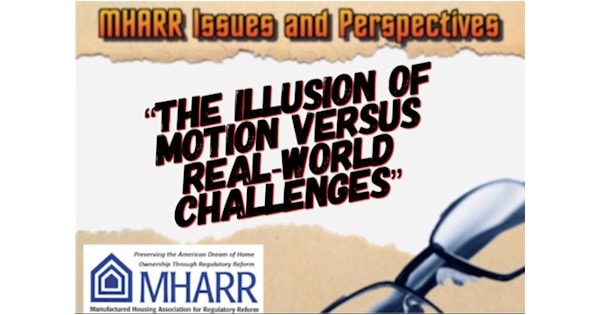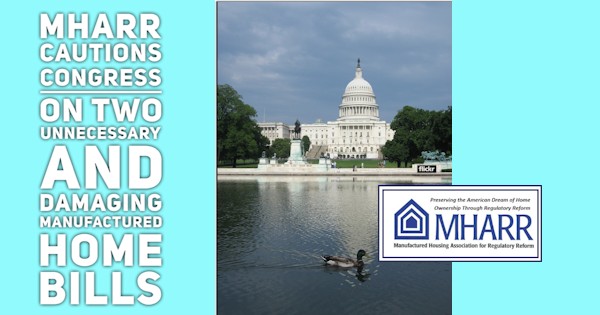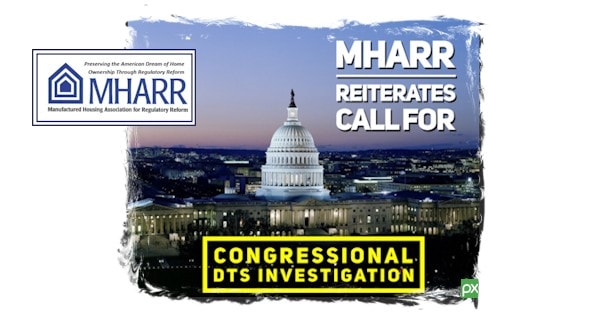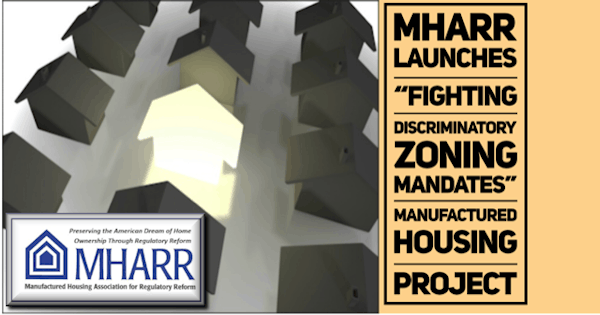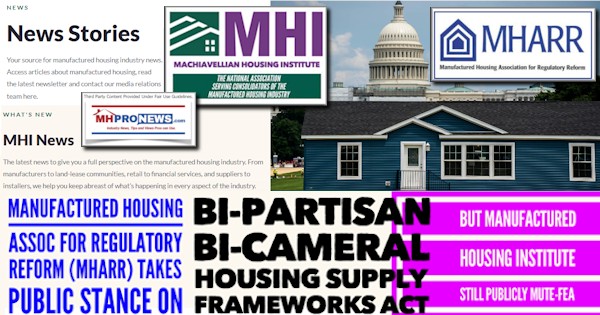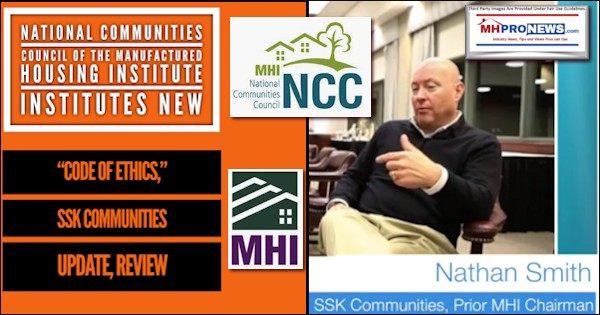
First, the facts – per the Manufactured Housing Institute (MHI) National Communities Council (NCC) documents, both quoted at length and also attached in their original form further below. Then, there will be some analysis and commentary.

NATIONAL COMMUNITIES COUNCIL CODE OF ETHICS As a Member of the Manufactured Housing Institute, (“MHI”), and the National Communities Council, (“NCC”), I subscribe to the principles set forth in the following Code of Ethics established by the NCC:
Members agree to engage in conduct and actions that promote and enhance the public image of manufactured housing and land lease manufactured housing communities.
Members agree to promote positive customer and resident relations as an essential responsibility.
Members agree to engage in conduct that respects the interests of customers, residents, vendors, and the general public regarding the manufactured housing industry and manufactured housing community lifestyle.
Members agree to conduct themselves in a professional, courteous, and considerate manner in communications and interaction with other members, residents, vendors, and the general public.
Members agree to adhere to applicable state and federal laws and regulations affecting the manufactured housing industry.

Members agree to support MHI in an effort to advance the interests of the manufactured housing industry, manufactured housing communities, and community operators.
Members agree to be bound by this NCC Code of Ethics, as well as the MHI Bylaws, as a condition of membership.
If it is determined that a Member is not acting in accordance to this NCC Code of Ethics, a Member may be expelled from NCC and MHI membership pursuant to NCC Operating Procedures Section 5 and Article II, Section 5 of the MHI Bylaws.
##
Among those asked for input about the article linked here were senior staff at the Manufactured Housing Institute (MHI). They remained publicly mute. That’s mentioned because it is true. It is also mentioned because it is relevant to these documents that they have now shard with their members.
But among the responses from MHI members that were quoted in the report linked here or further below, was the two MHI/NCC documents cited above and below.
A message this morning, perhaps in response to these reports (it didn’t specify) said, “You guys [MHProNews] may be having more of an impact on MHI outside of the organization than you ever did when you were members. Keep it up.”
The NCC code of ethics came shown above was mentioned in the document quoted at length below.

MHI – News & Updates August 21, 2019
National Communities Council Institutes Code of Ethics
As the national trade association for the manufactured housing industry, MHI is working to ensure that the media, policymakers, and homebuyers understand the positive aspects of living in land-lease communities. As a part of this effort, MHI’s National Communities Council (NCC) has instituted a Code of Ethics, which are a set of principles that NCC members must subscribe to as part of their membership with MHI.
While already the norm for professional owners and managers, the NCC has formally reaffirmed the membership’s commitment to residents. The principles in the Code of Ethics focus on promoting the benefits of manufactured housing and land-lease communities, as well as customer and resident relations.
Reliable, high-quality, and professional services are integral to providing an exceptional quality of life for residents, and the vast majority of investor-owned, land-lease communities in the United States are professionally managed, well-run and well-maintained by responsible owners. These owners and managers are vested in the manufactured housing business and seek property management training and certifications like becoming an Accredited Community Manager through the Manufactured Housing Educational Institute.
Recent MHI consumer research shows that residents who live in land-lease communities are highly satisfied with their housing choice. According to MHI’s consumer survey, 95 percent of residents in 55+ communities and 87 percent of residents in all-age communities report satisfaction with their homes. Further, 76 percent in 55+ communities are highly satisfied. Residents cite affordability and the ability to own their home as the top reasons for selecting manufactured housing. Sixty-two percent anticipate staying in their homes for more than 10 years, with 38 percent saying they plan to stay in their homes indefinitely. MHI’s research also reveals a high likelihood of residents recommending this housing choice to others.
The NCC Code of Ethics is available to MHI members on MHI’s webpage.
##
Both documents are linked here and here.
Analysis and Commentary
As one of the comments in reaction to the Rolfe Report to MHProNews said; “I believe this was a very serious effort on the part of MHI to have a meaningful Ethics policy. Some of the worst offenders are current MHI members. Others, are former students of various get rich in the MH business schools.”
That is both praise and blame of MHI and their NCC division from the same source. At times, one wonders if MHI believers realize how self-contradictory that organization and its leaders are? As an example, it was Frank Rolfe who tossed Nathan Smith – then MHI’s chair, and still on their executive committee – under the bus in the quoted comment below. But in doing so, didn’t Rolfe throw himself under the bus too?
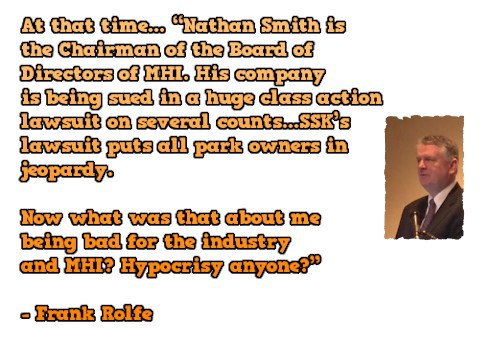
Time will tell if the prediction that this code of ethics is a “serious effort” by MHI or not proves to be wishful thinking or a serious reality.
That said, there are already reasons to doubt that this is any more than what another industry professional reaction comment called it ‘a fig leaf.’ Why?
Perhaps because if MHI were serious about their ethics policy, then why didn’t Rick Robinson or Lesli Gooch shed light on the Rolfe issue when asked by MHProNews for comment? Isn’t the track record of the roughly past 2 years that MHI has ducked responses to substantive, serious questions? Haven’t they de facto swept under the rug problematic or unethical MHI behavior by MHI leaders?
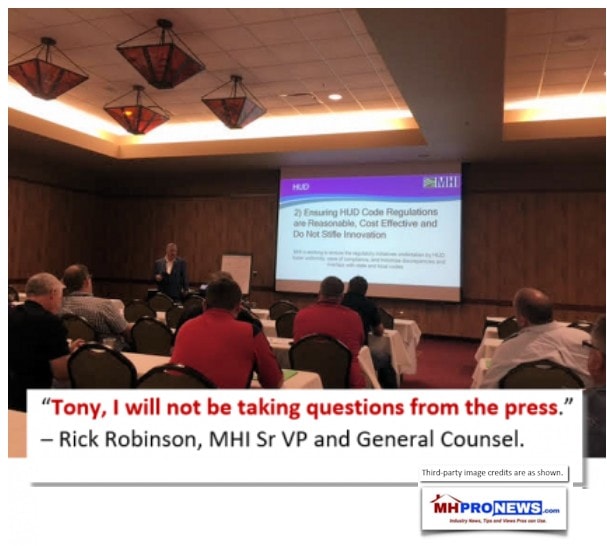
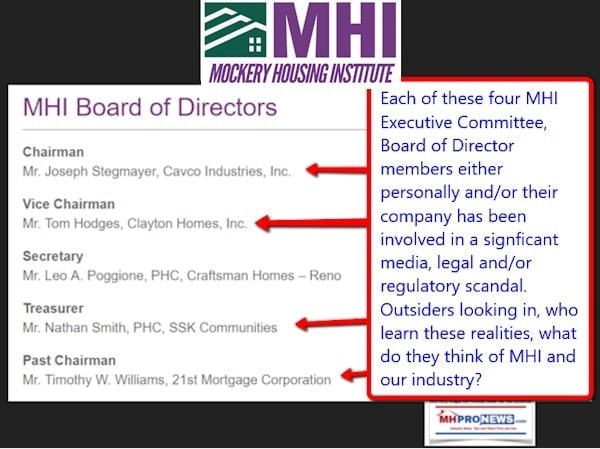
Which of the larger companies involved in various scandals in 2019 alone has been ejected? After all, the NCC document stated that “While already the norm for professional owners and managers, the NCC has formally reaffirmed the membership’s commitment to residents…” If it is a norm, where was the enforcement action toward the various companies mentioned in the John Oliver video, covered by the report linked below?
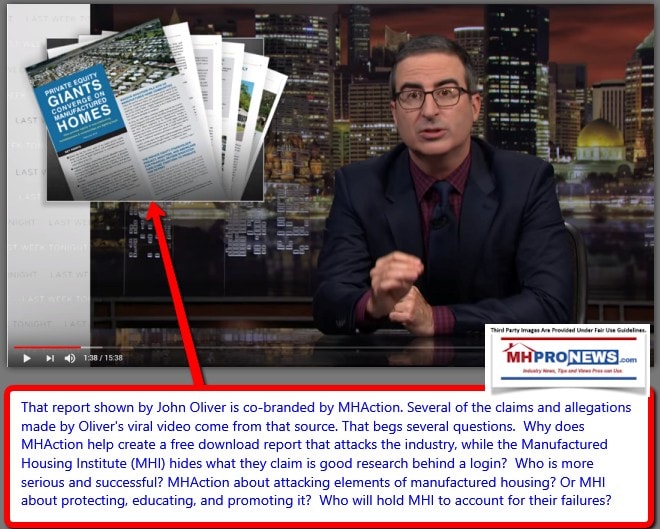
With regard to that video, let’s be fair to SSK Communities, which was cited in that report, because a mainstream news clip about SSK was used by John Oliver’s video. Recently SSK had their BBB rating raised from an F to an A+. One wonders how that happened so quickly, since our last report on that topic?
But as professional readers have said, putting the spotlight on purported black hat companies may be having an impact on at least a few. If in fact SSK has improved their resident relations and business practices, that’s a positive. If so, that’s good and should be encouraged.
That said, SSK has 4 homes that have been placed on a legal notice for an auction. See that SSK legal notices document linked here. That may be entirely normal business. But is that possibly a sign of a prior complaint against that firm that may be returning? One of the very issues that John Oliver and Frank Rolfe blasted Nathan Smith and SSK Communities for doing? Recall that evictions and flipping that were part of the media scandal involving Nathan Smith and SSK – are those notices possible evidence that the practice is coming back to the forefront? How serious is this updated code of ethics?
There are certainly a variety of complaints that can happen to a business. Some are unfair ones. While the customer is often right, anyone in business long enough knows that at times when unreasonable customers are not spotted before a deal is closed. As seasoned professionals know, it can be better to pass on doing business with some customers then sell them, and we aren’t referring to protected classes. If a person or household members exhibit signs of being unable to be pleased and they are litigious, isn’t it better not to sell them?
That said, the kinds of issues that have made the news in a harmful fashion about manufactured housing are most often not that kind of issue at all. Rather, they are consumers who have demonstrably been taken advantage of or were improperly served. While reportedly compensated MHI emeritus mouthpiece George F. Allen has been bobbing and weaving around some of these issues, why has he yet to do is admit to and correct his own connections to scandals? Does Senator Todd Young (IN-R) really want to be associated with that when he comes up for reelection? Given how focused a growing number of politicians, including 2020 Democrats like Senator Elizabeth Warren or former HUD Secretary Julian Castro are on the problematic reports about aggressive site rent hikes in manufactured housing communities, does Young’s staff think this won’t come back to haunt him?

It was arguably precisely the kind of blowback from negative mainstream media – or this industry-focused trade media – that caused this push by MHI to revise their code of ethics and push it out to their members again.
As that MHI member source said, “…Some of the worst offenders are current MHI members. Others, are former students of various get rich in the MH business schools.” Facts are what they are.
Does what former MHI member and award-winner Marty Lavin said to MHProNews recently apply?
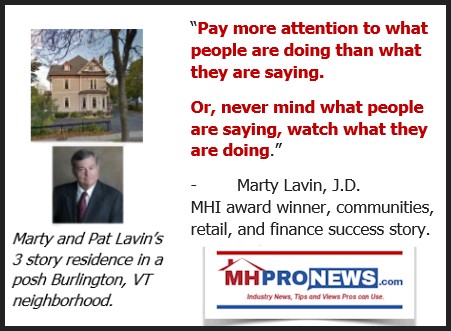
Ponder anew what Nathan Smith said about being pro-active about heading off industry issues at MHI – how did that pan out? Think about what he said about his desire to get ever more communities, which on the surface can be fine, but was or is there a method to those consolidations that is problematic or illegal? With that in mind, ponder another reaction from last night from an MHI member who said:
“The politics of professional associations is tough to navigate. Especially, when consolidation creates an imbalance in the membership along with leadership issues.”
Is there any doubt that this impacts the image of your industry, and thus your business? Hey, in fairness, at the time the video above was made, some things were not as clear then as they are today, right? Isn’t it ever more clear in hindsight that consolidation was part of the MHI leadership plan, despite what MHI’s own antitrust guidelines might say? That’s food for thought and future review of performance vs. words in this, your first installment today of manufactured home “Industry News, Tips, and Views Pros Can Use,” © where “We Provide, You Decide.” © ## (News, analysis, inspiration, and commentary.)
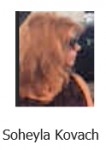
Soheyla is a managing member of LifeStyle Factory Homes, LLC, the parent company to MHProNews, and MHLivingNews.com. Connect with us on LinkedIn here and here.
Related Reports:
Click the image/text box below to access relevant, related information.
